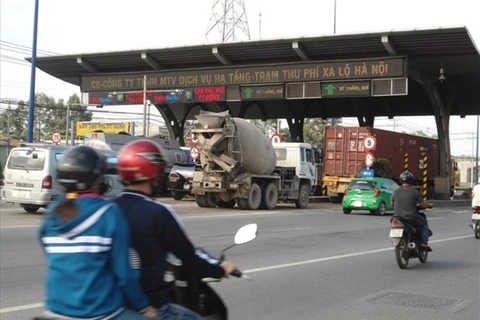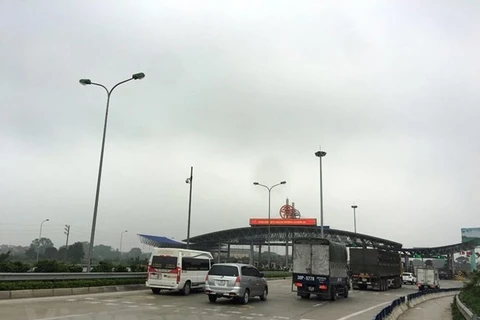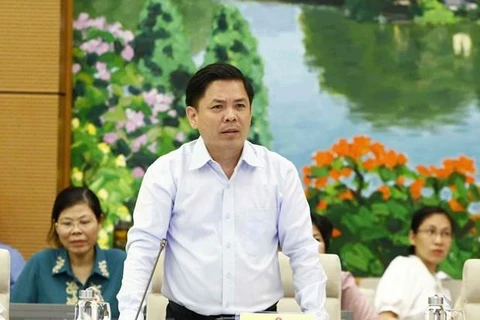Hanoi (VNS/VNA) - The National Assembly (NA) Standing Committee has recently proposed removing the road maintenance fund and petrol price stabilisation fund.
Nguyen Duc Hai, Chairman of the NA's Committee on Finance and Budget, said the legal system on managing and using the funds was complex and unclear. In addition, no agency at central or local levels had been assigned to manage the funds.
Hai said the collection for the funds has seen shortcomings and still depends on the State budget.
Meanwhile, the functions and tasks of the funds overlapped and were ineffective as they coincide with budget spending tasks.
The move would be a boon for many businesses as road fees have reduced their competitiveness.
On the road maintenance fund, Nguyen Huu Vinh, Director of Nhat Quang Transport Company in Ho Chi Minh City, said road fees have always been a burden in transport because they are calculated into costs. However, the benefits for vehicle owners from the fees have been unclear.
Vinh said 1 percent of the collection was used for the road maintenance fund’s management while 99 percent was contributed to the fund at central level.
Notably, the management, use and payments of the road maintenance fund have caused debates about the rights of vehicle owners.
Nguyen Chi Hoang, Director of Phuong Hoang Transport Company, said the situation of degraded roads has not been resolved.
In reality, the road maintenance fund has been a burden for transport businesses and vehicle owners. Therefore, the collection of road maintenance fees needs to be transparent and used for road maintenance. Vehicle owners pay road maintenance fees at registration centres once a year at quite high rates, but the benefits they enjoy are not quite clear.
“If we abolish the road maintenance fund and petrol price stabilisation fund, people and businesses will be happy to have reduced costs,” he said.
He added that if these funds can’t be abolished, it is necessary to change the way road maintenance fees are collected to ensure the rights of vehicle owners.
Meanwhile, the proposal to remove the petrol price stabilisation fund has received support, but some fear surging retail prices without the fund.
Nguyen Anh Tuan, Director of the Price Management Department under the Ministry of Finance, told Tuoi Tre (Youth) newspaper that there were many factors to consider before abolishing the petrol price stabilisation fund. Therefore, Decree No 83 on petrol trading should be revised with contents of price management, basis price and reserve.
Tuan said when the Government still manages petrol prices, the Ministry of Industry and Trade would stipulate the basis price. Only when the State does not manage the basis price could the fund possibly be abolished.
Economist Ngo Tri Long said only when the country fully embraced the market price of petroleum could the fund be removed.
At present, with the Government and National Assembly's top targets stabilising the macro-economy, curbing inflation and the State is operating petrol prices, it is impossible to remove this fund, Long said.-VNS/VNA
Nguyen Duc Hai, Chairman of the NA's Committee on Finance and Budget, said the legal system on managing and using the funds was complex and unclear. In addition, no agency at central or local levels had been assigned to manage the funds.
Hai said the collection for the funds has seen shortcomings and still depends on the State budget.
Meanwhile, the functions and tasks of the funds overlapped and were ineffective as they coincide with budget spending tasks.
The move would be a boon for many businesses as road fees have reduced their competitiveness.
On the road maintenance fund, Nguyen Huu Vinh, Director of Nhat Quang Transport Company in Ho Chi Minh City, said road fees have always been a burden in transport because they are calculated into costs. However, the benefits for vehicle owners from the fees have been unclear.
Vinh said 1 percent of the collection was used for the road maintenance fund’s management while 99 percent was contributed to the fund at central level.
Notably, the management, use and payments of the road maintenance fund have caused debates about the rights of vehicle owners.
Nguyen Chi Hoang, Director of Phuong Hoang Transport Company, said the situation of degraded roads has not been resolved.
In reality, the road maintenance fund has been a burden for transport businesses and vehicle owners. Therefore, the collection of road maintenance fees needs to be transparent and used for road maintenance. Vehicle owners pay road maintenance fees at registration centres once a year at quite high rates, but the benefits they enjoy are not quite clear.
“If we abolish the road maintenance fund and petrol price stabilisation fund, people and businesses will be happy to have reduced costs,” he said.
He added that if these funds can’t be abolished, it is necessary to change the way road maintenance fees are collected to ensure the rights of vehicle owners.
Meanwhile, the proposal to remove the petrol price stabilisation fund has received support, but some fear surging retail prices without the fund.
Nguyen Anh Tuan, Director of the Price Management Department under the Ministry of Finance, told Tuoi Tre (Youth) newspaper that there were many factors to consider before abolishing the petrol price stabilisation fund. Therefore, Decree No 83 on petrol trading should be revised with contents of price management, basis price and reserve.
Tuan said when the Government still manages petrol prices, the Ministry of Industry and Trade would stipulate the basis price. Only when the State does not manage the basis price could the fund possibly be abolished.
Economist Ngo Tri Long said only when the country fully embraced the market price of petroleum could the fund be removed.
At present, with the Government and National Assembly's top targets stabilising the macro-economy, curbing inflation and the State is operating petrol prices, it is impossible to remove this fund, Long said.-VNS/VNA
VNA
























